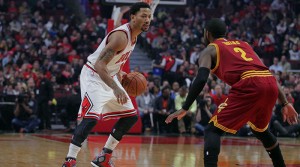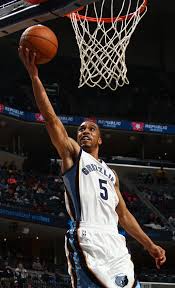 Over the weekend, we saw a trio of buzzer-beaters from Derrick Rose, Paul Pierce and LeBron James win NBA
Over the weekend, we saw a trio of buzzer-beaters from Derrick Rose, Paul Pierce and LeBron James win NBA  playoff games.
playoff games.
All three were certainly fantastic moments that ended intense, exciting postseason games. But before we get too excited about them, let’s consider these two factors.
1. The shots by Rose and Pierce were lucky. Yes, lucky. The next NBA player who actually tries to bank in a straightaway shot will be the first. Was some experience and skill involved in finding the space to release the shots and getting them generally on target? Of course. But no one who considers himself to be any sort of a shooter tries to bank in a shot from the top.
2. Isn’t this what players like Rose, Pierce and James are supposed to do? These guys are stars in every sense of the word. Folks in Chicago have been waiting for this from Rose – a former MVP – for four years. Pierce is a future Hall of Famer who keeps saying, “This is why they brought me here” to Washington. And James is merely the best player in the world who has done this before, several times.
This what we’ve come to expect in the postseason from stars such as Rose, Pierce and James. It really shouldn’t surprise us.
What should surprise us is someone with far less of a reputation and resume stepping up in the playoffs and playing the best basketball of his career. And there have been a handful of those players through the first two rounds.
Below is a list of a half-dozen players who have been huge surprises in the postseason. Some already have been eliminated. Some are still alive. But all of them have positioned themselves for bigger and better things in the future.
BOJAN BOGDANOVIC, F, BROOKLYN: There were times throughout his rookie season when Bogdanovic’s shot was not going down and he allowed that to impact the rest of his game, earning a seat on coach Lionel Hollins’ bench for extended stretches. But he had a huge hand in Brooklyn’s late-season push to make the postseason and carried that into the playoffs, where he both shot and played with assertiveness unbecoming a rookie. He averaged 10.3 points while shooting 39 percent in the  six games vs. Atlanta, which certainly wasn’t spectacular. But he played with confidence, went for 19 and 15 points in Brooklyn’s two home wins over the top seed and averaged 34 minutes in the series, which means he won back Hollins’ trust in him. The Nets have plenty of issues going forward but have a nice young talent in Bogdanovic, who is under contract at a very reasonable number for two more years.
six games vs. Atlanta, which certainly wasn’t spectacular. But he played with confidence, went for 19 and 15 points in Brooklyn’s two home wins over the top seed and averaged 34 minutes in the series, which means he won back Hollins’ trust in him. The Nets have plenty of issues going forward but have a nice young talent in Bogdanovic, who is under contract at a very reasonable number for two more years.
DeMARRE CARROLL, F, ATLANTA: His streak of 20-point games ended at six – the longest by any Hawks player in the postseason since scoring machine Dominique Wilkins – with 14 in Saturday’s loss at the buzzer to Washington. But his 18.3 points leads Atlanta in scoring in the playoffs. Part of that has been the preoccupation of Brooklyn and Washington with trying to shadow Kyle Korver and prevent Jeff Teague from getting into the paint. But part of it also is Carroll recognizing he has more space to operate and attack the basket. He also leads the Hawks in 3-point shooting at 45.5 percent. When Atlanta had to have Game 5 vs. Brooklyn, he went for 24 points. When it had to have Game 2 vs. Washington, he dropped 22. The Hawks have to have Game 4 tonight, so we will see what Carroll brings. He will be a free agent at the end of the season and has a huge decision to make.
COURTNEY LEE, G, MEMPHIS: It is easy to overlook Lee when discussing the Grizzlies, whose ground-and-pound style recalls their unrelenting defense led by Tony Allen and their unconventional desire (by today’s NBA standards) to force-feed low-post bigs Marc Gasol and Zach Randolph. Lee averaged just 10.1 points during the season, which ranked 33rd among shooting guards behind folks such as Evan Fournier, Gerald Green and Jodie Meeks. He often sat at the end of games as coach Dave Joerger went with Allen’s defense. But Lee has come on in the postseason, helping offset the three-game absence of Mike Conley by averaging 15.1 points on 56 percent shooting, including a blistering 50 percent from the arc that has given the Grizzlies the  extra spacing that they need against Golden State’s normally solid defense. He also has been virtually automatic (22-of-23) from
extra spacing that they need against Golden State’s normally solid defense. He also has been virtually automatic (22-of-23) from
the line and had a huge 3-pointer to quell a rally by the Warriors in Game 3. Now Joerger is using Lee and Allen together at the end of games and pulling Jeff Green. Lee doesn’t become a free agent until the money bonanza of 2016, when he will be 30 years old.
C.J. McCOLLUM, G, PORTLAND: Yes, the Trail Blazers’ season unraveled when emotional leader and 3-point bomber Wesley Matthews suffered a torn Achilles tendon. When backup Arron Afflalo missed the start of the playoffs with a shoulder injury, that put McCollum on the spot against the grit and grind of the Memphis Grizzlies. The second-year guard came in as a virtual playoff novice, having played just 25 postseason minutes in 11 games as a rookie. And to be sure, he looked like a deer in the headlights in his first two games, rushing possessions while making just 4-of-21 shots, including all six 3-pointers. Perhaps a return home helped his confidence, because McCollum averaged 25.7 points over the last three games, shooting 61 percent (28-of-46) overall and 65 percent (11-of-17) from the arc. It should be noted that a portion of that outburst came against Tony Allen, one of the best perimeter defenders in the business. By the time the series ended, McCollum was Portland’s most efficient option on offense and LaMarcus Aldridge and Damian Lillard clanged away. McCollum still has to make the jump from rotation player to starter, which is no easy task. But he is under team control for two more seasons and gives Blazers GM Neil Olshey a hole card this summer in his dealing with Matthews and Afflalo, both of whom are headed to free agency.
OTTO PORTER JR., F, WASHINGTON: The second-year forward’s emergence in the postseason hasn’t received as much attention as that of Austin Rivers, perhaps because Otto Porter Sr. isn’t an NBA coach. But it is just as surprising, given Porter’s  production prior to the playoffs. Keep in mind that as the third pick overall, Porter was arguably the worst rookie in the 2013 draft, which has been pretty awful to date. As recently as late March, he was still collecting DNP-CDs. But he has moved ahead of Rasual Butler and Martell Webster in coach Randy Wittman’s playoff rotation and is averaging 11.4 points on 52 percent shooting (46 percent on threes) with 8.1 rebounds in 33 minutes over seven postseason games. His emergence has allowed the Wizards to go small with Paul Pierce at power forward, while Kris Humphries and Kevin Seraphin have been reduced to spectators. This has been by far the best stretch of Porter’s career and could not be coming at a more opportune time. Not bad for a guy who played seven postseason minutes a year ago. The youngster is positioning himself nicely to
production prior to the playoffs. Keep in mind that as the third pick overall, Porter was arguably the worst rookie in the 2013 draft, which has been pretty awful to date. As recently as late March, he was still collecting DNP-CDs. But he has moved ahead of Rasual Butler and Martell Webster in coach Randy Wittman’s playoff rotation and is averaging 11.4 points on 52 percent shooting (46 percent on threes) with 8.1 rebounds in 33 minutes over seven postseason games. His emergence has allowed the Wizards to go small with Paul Pierce at power forward, while Kris Humphries and Kevin Seraphin have been reduced to spectators. This has been by far the best stretch of Porter’s career and could not be coming at a more opportune time. Not bad for a guy who played seven postseason minutes a year ago. The youngster is positioning himself nicely to back up Kevin Durant when he arrives in 2016 take over when Pierce’s contract expires after next season.
AUSTIN RIVERS, G, LA CLIPPERS: At the very least, he has used the postseason to prove that he is actually an NBA player, despite some mishaps here and there. There have been some legitimate questions about whether Rivers even belonged in the league, and playing for his father only increased the whispers. But he saved the Clippers’ season with an out-of-nowhere 16 points on 7-of-8 shooting off the bench in Game 4 at San Antonio and has used the Houston series to show that performance was not a fluke, reaching double figures in all four games and averaging 16.0 points on 56 percent shooting while starting twice in place of the injured Chris Paul. Prior to this series, Rivers had scored in double figures in four straight games once in his three NBA seasons. He is an unrestricted free agent this summer and may have already earned himself a contract for next season, nepotism notwithstanding.
Chris Bernucca is the managing editor of SheridanHoops.com. His columns appear Monday during the season. You can follow him on Twitter.